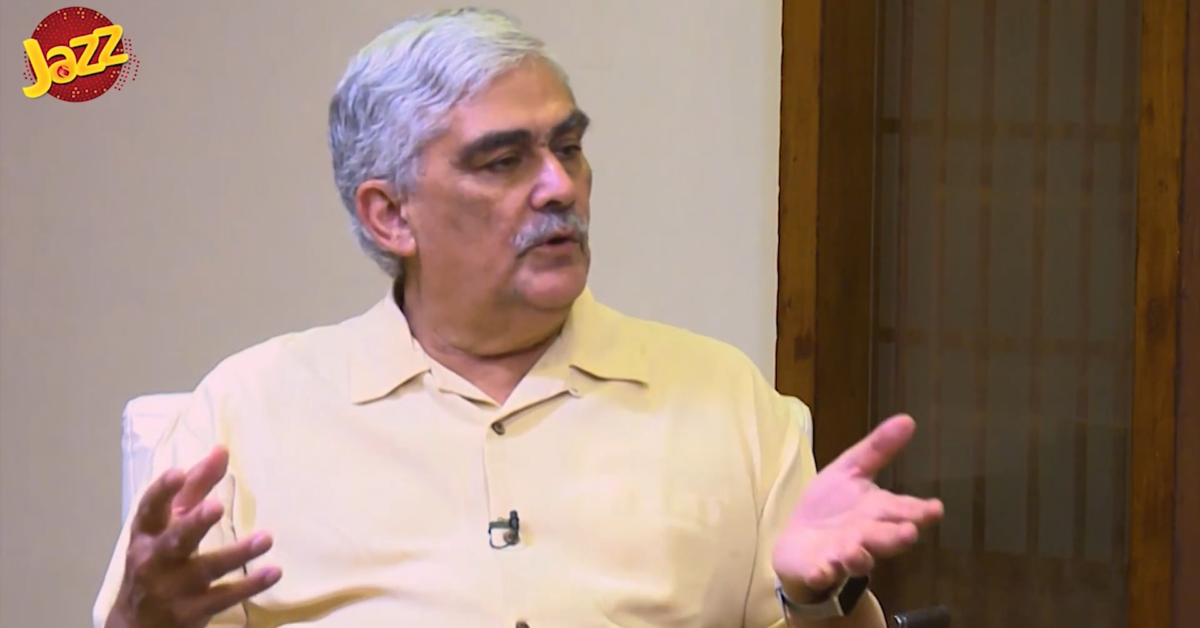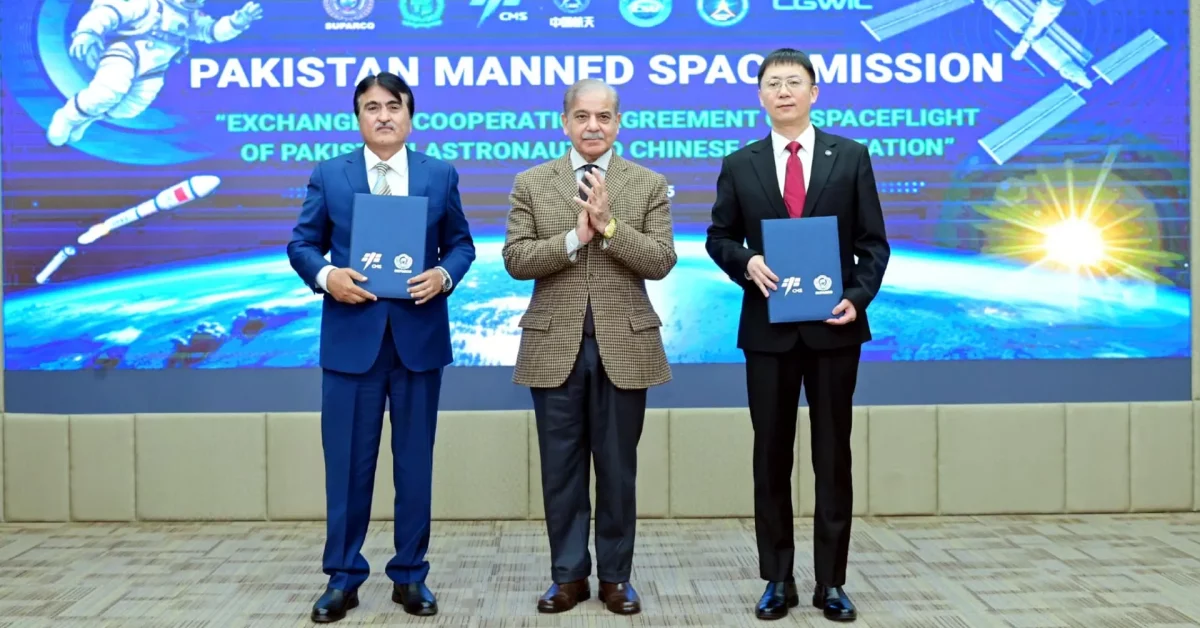
Is Pakistan Ready for Digital Transformation? | Conversations@Jazz
March 6, 2019
Meet Jazz’s Global Digithon Winner! | Conversations@Jazz
March 26, 2019Pace your Digital Skills, or Lose the Race to the Future | Conversations@Jazz
Nadeem ul Haque; Former Deputy Chairman for Planning Commission Pakistan joined Aisha Sarwari Director Corporate Communications and Sustainability, Jazz for a discussion on Digital Pakistan Sectoral Conference. They spoke about the challenges, strengths, and opportunities present for digitalization in today’s age.
Haque appreciated the initiative of Jazz’s ‘Digital Sectoral Vertical Workshop’ and acknowledged the efforts of Pakistani telecom companies investing in the socio-economic landscape through digitalization. He envisions to broaden the scope of these efforts to academia, especially in universities.
Taking a cue from his book ‘Looking Back: How Pakistan Became an Asian Tiger by 2050’, Sarwari questioned his take on ‘sectors’ and ‘systems’; to which he explained that we must see things as systems and not sectors. He mentioned seeing everything as a system and with the lens of digitalization, we are in a better place to come up with solutions that are holistic, all-encompassing and complementing each other.
Haque does not see technology as saviour, but rather a tool to bring about a change, highlighting that podcasts started 20 years ago and still happen to be one of the most useful educational opportunity & tool and still so many people in our part of the world do not use them.
“It is what you do with the technology makes the difference,” he said.
On the culture of entrepreneurship in Pakistan, Haque believes that the Pakistani entrepreneurial landscape has several issues. One major issue is the distance of entrepreneurs from cities. However, he acknowledged the efforts of Jazz and the National Incubation Center (NIC) providing a shared working space for all entrepreneurs.
As parting words, he urged Jazz to start investing in students and universities and keep alive the tradition of continuous learning because that is the only way forward for Pakistani society.
Nadeem ul Haque: I think it is a great initiative. I would say its timely, its late in coming but very important. I think the mobile phone companies are doing a great job in this country, as far as the revolutions, we are proud of that but I think you need to take responsibility too and I am glad to see that you are and I am glad to see that you are leading a debate and I would like to see that you should carry this forward to the universities and charge the kids up.
Aisha Sarwari: I am glad you said that. So, in your book – ‘Looking Back: How Pakistan Became an Asian Tiger by 2050’ it has a very interesting title. In your lessons learnt section, you say that, ‘think systems and not sectors’ so today’s conference was about sectors. What do you mean when you say think systems?
Nadeem ul Haque: I think more than anything what technology has done, it has cut cross traditional disciplines. I am an economist, I train to be an economist. So, a doctor trains to be a doctor. Now those divides are breaking down. I think we really need to begin to see the country as a system, the economy as a system, the telecommunication as a system and then with digitization. And now when you begin to think like that even our bodies are a set of DNAs and DNA is a set of digital system. So, everything becomes an information system. That camera there is a system that was designed by somebody, it’s a piece of information that is materialized.
Aisha Sarwari: We are very happy to be here with Dr. Nadeem ul Haque. The fact that people think that sectors in Pakistan is all about what’s the next big sector of GDP growth. But they don’t take care of the administration and security. Some of the basic things that a state should do. Why do we have that mindset?
Nadeem ul Haque: Absolutely. I think the key thing is that when you begin to think system as the whole then you try and see how the system works. And then what you are saying comes to the mind, immediately, that the system is not working because the centre is not working which is the state. The state is incapable of making the policy. Second thing that you begin to see is that what we lack is research and thinking. When you don’t have research and thinking, then, definitely you are not going to make good policy. When you become lazy like we people have become lazy, we think that everything would come from outside the country. That the World Bank would come and fix the innovation policy, the CPEC will do, it’s a gamechanger, I resent that term. The only gamechanger is me, myself. Nobody changes my game. Your dad can’t change your game. Your family can’t change your game. You could have changed it yourself. We are the only country that thinks that gamechangers will come from outside.
Aisha Sarwari: It’s a messiah mentality. Some come and rescue us.
Nadeem ul Haque: You have put it very well. It’s a messiah mentality. You are looking for a messiah. Now I fear that technology is becoming a messiah for us. Technology is not going to save us. Technology is neutral, it’s in your hand and in everybody else’s hand. India and China, has it. It is what you do with technology.
Aisha Sarwari: We are very happy to be here with Dr. Nadeem ul Haque. I found it very interesting that you asked this very digital audience of about 200 – 300, to raise their hands if they have ever heard a podcast or know what a podcast is. And a quarter of them raised their hands and they are the cream of the crop technologists.
Nadeem ul Haque: Don’t forget that podcast in 20 years old. It is not a recent innovation. Podcasts are 20 years old. The smartphones, I think, are 11 years old. Cheap smartphones have been coming to Pakistan for the last 6-7 years. I know all poor people are getting smartphones. Why are we not listening to the podcast? Podcast is one of the greatest educational opportunities that I know of.
Aisha Sarwari: Any parting words for Jazz’s ambition to make Pakistan Digital completely by next 5 years?
Nadeem ul Haque: I think Jazz should start investing in universities and students. I think where our cooperates fail is that they are divorced from universities. And that is the sad tragedy. The problem is that or government is not a learning organization, our private sector is not a learning organization. I go to my private sector friends like last night I met some of them. I ask them to hold a talk and they can’t. I used to hold a lot of talks and seminars in the planning commission. And I can tell you one thing that not a single civil servant, DMG or PAS or whatever you call them, no one wanted to show up. Because they all think that they are above learning. Whereas, Bill Gates, when you go to his website, says that he is learning all the time. He takes Khan Academy courses, he takes Coursera courses etc. Why are we so unlearning? If we are unlearning, I don’t think we will get there.
Aisha Sarwari: We are very happy to be here with Dr. Nadeem ul Haque. Jazz is focusing on NIC, which is that they take youth and give them entrepreneurial training. What is the one barrier that you feel that young entrepreneurs have to make it in Pakistan?
Nadeem ul Haque: Oh, not one. There are too many. But the biggest barrier that they have is that they don’t live in the cities. They live in suburban barren places which are non-creative. I have written and talked about it a lot. In 18th century England, when steam engine and spinning jenny came along. There was huge amount of disruption on entrepreneurship. See Detroit for example, huge amount of entrepreneurship or New York. But entrepreneurship always happens in clusters and it happens in cities. In a city where complex system of innovation occurs. Where people hang around, hang together to make innovation because they are curious, they just love to question. Because they love to change.
Aisha Sarwari: You need a safe place. Of course, you need coffee as well. By the way coffee is a huge innovator.
Nadeem ul Haque: Huge innovator in England.
Aisha Sarwari: But with an online space, you can at least try and create something similar.
Nadeem ul Haque: Have you ever try to do a meeting on skype?
Aisha Sarwari: Yeah, I have. It is very awkward.
Nadeem ul Haque: It is okay. You were referring to the coffee. There is this famous book – From where Good Ideas Come from by Johnson.
Aisha Sarwari: There is a Ted Talk on it.
Nadeem ul Haque: Absolutely correct. What human beings have also found out in psychological study is that we need to be physically together. There is something about the physicality. It’s not always that you can interact with each other over the net. We need the physical closeness for the ideas to spark. Ideas don’t get sparked when you are sitting miles away. So, we need these types of spaces. The tragedy here is that the way cities are zoned, they are zoned only for houses and cars.
Aisha Sarwari: And there are classes. Certain classes would be out of that inspiration.
Nadeem ul Haque: Absolutely. We are a very segregated, exclusionary society and we love that. We love exclusion. We love our elitism. But that is not innovation. That innovation won’t happen unless we let kids come out and let go of the hierarchical culture. Kids can’t be rebellious. Hippies created the revolution. They have to be rebellious. Rebellion is part of the innovation.
Aisha Sarwari: You are the first doctor who is giving us the permission to rebel. To come to safe spaces and to create ideas. To have academic linkages. Dr. Nadeem, thank you so much for your time. We really appreciate you being here. Not only at the conference but also for giving us the interview. We will post it online and retweet it.
Nadeem ul Haque: Thank you very much and all the best.






